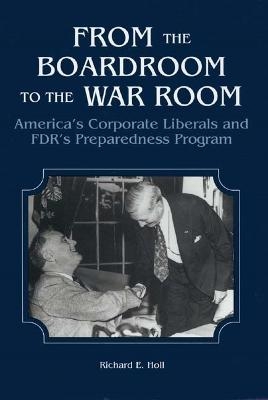
From the Boardroom to the War Room
America's Corporate Liberals and FDR's Preparedness Program
Seiten
2005
University of Rochester Press (Verlag)
978-1-58046-192-4 (ISBN)
University of Rochester Press (Verlag)
978-1-58046-192-4 (ISBN)
- Titel ist leider vergriffen;
keine Neuauflage - Artikel merken
This book chronicles the ideological changes experienced by the corporate liberals between World War I and World War II, illustrating how this group overcame a number of constraints to help reconfigure the American economy and prepare the country for war.
Between World War I and World War II, America's corporate liberals experienced a profound ideological change. In the 1920s, corporate liberals embraced company-specific solutions to economic problems. They believed that if every company, in every industry, employed advanced managerial techniques -- such as granting workers non-wage benefits to increase their job satisfaction -- employment, production, and profits could be stabilized and prosperity sustained indefinitely. The Great Depression, of course, made a mockery of this idyllic vision. Corporate liberals admitted that private efforts failed to maintain the nation's economic health, ultimately endorsing large-scale governmentintervention to bail out the stricken economy. By 1935, the corporate liberal conversion from privatism to business-government partnership was well under way.
Corporate liberals served President Franklin Roosevelt throughoutthe Depression and preparedness periods. Marion Folsom of Eastman Kodak Corporation, Edward Stettinius, Jr. of United States Steel, and others joined New Deal agencies struggling to re-employ workers and bring about social security. Later, at Roosevelt's request, they entered emergency preparedness bodies to ready the United States for the possibility of war. When Japan attacked Pearl Harbor on December 7, 1941, the reconfigured American economy (which the corporate liberals had done so much to create) proved capable of mass producing weapons and other equipment. The bottom line, staunchly revisionist in nature, is that the corporate liberals ran an effective mobilization campaign, overcoming isolationist resistance to rearmament, Roosevelt's reluctance to grant them genuine authority, and other constraints.
Richard E. Holl is Professor of History at the Lees College Campus of Hazard Community and Technical College. His latest article, on Axis prisoners of war in Kentucky, won the Collins Award of the Kentucky Historical Society.
Between World War I and World War II, America's corporate liberals experienced a profound ideological change. In the 1920s, corporate liberals embraced company-specific solutions to economic problems. They believed that if every company, in every industry, employed advanced managerial techniques -- such as granting workers non-wage benefits to increase their job satisfaction -- employment, production, and profits could be stabilized and prosperity sustained indefinitely. The Great Depression, of course, made a mockery of this idyllic vision. Corporate liberals admitted that private efforts failed to maintain the nation's economic health, ultimately endorsing large-scale governmentintervention to bail out the stricken economy. By 1935, the corporate liberal conversion from privatism to business-government partnership was well under way.
Corporate liberals served President Franklin Roosevelt throughoutthe Depression and preparedness periods. Marion Folsom of Eastman Kodak Corporation, Edward Stettinius, Jr. of United States Steel, and others joined New Deal agencies struggling to re-employ workers and bring about social security. Later, at Roosevelt's request, they entered emergency preparedness bodies to ready the United States for the possibility of war. When Japan attacked Pearl Harbor on December 7, 1941, the reconfigured American economy (which the corporate liberals had done so much to create) proved capable of mass producing weapons and other equipment. The bottom line, staunchly revisionist in nature, is that the corporate liberals ran an effective mobilization campaign, overcoming isolationist resistance to rearmament, Roosevelt's reluctance to grant them genuine authority, and other constraints.
Richard E. Holl is Professor of History at the Lees College Campus of Hazard Community and Technical College. His latest article, on Axis prisoners of war in Kentucky, won the Collins Award of the Kentucky Historical Society.
RICHARD E. HOLL is professor of History at the Lees College Campus of Hazard Community and Technical College.
Meet the New Era Corporate Liberals: Supporters of Welfare Capitalism and Hooverian Associationalism
Bad Times and a New Deal: The Corporate Liberals Accede to Sustained Business-Government Collaboration
The Unready State
The Corporte Liberals, the War Resources Board, and Industrial Mobilization Planning
Preparedness Proper: The Corporate Liberals and the National Defense Advisory Commission
One Step Short of War: The Corporate Liberals and the Office of Production Management
| Erscheint lt. Verlag | 16.9.2005 |
|---|---|
| Zusatzinfo | 12 b/w illus. |
| Verlagsort | Rochester |
| Sprache | englisch |
| Maße | 152 x 229 mm |
| Themenwelt | Geschichte ► Allgemeine Geschichte ► Neuzeit (bis 1918) |
| Geschichte ► Allgemeine Geschichte ► 1918 bis 1945 | |
| Geisteswissenschaften ► Geschichte ► Regional- / Ländergeschichte | |
| Technik | |
| Wirtschaft ► Betriebswirtschaft / Management ► Unternehmensführung / Management | |
| ISBN-10 | 1-58046-192-1 / 1580461921 |
| ISBN-13 | 978-1-58046-192-4 / 9781580461924 |
| Zustand | Neuware |
| Haben Sie eine Frage zum Produkt? |
Mehr entdecken
aus dem Bereich
aus dem Bereich
Giordano Bruno - ein ketzerisches Leben
Buch | Hardcover (2024)
C.H.Beck (Verlag)
CHF 41,85
Europa 1848/49 und der Kampf für eine neue Welt
Buch | Hardcover (2023)
DVA (Verlag)
CHF 67,20


